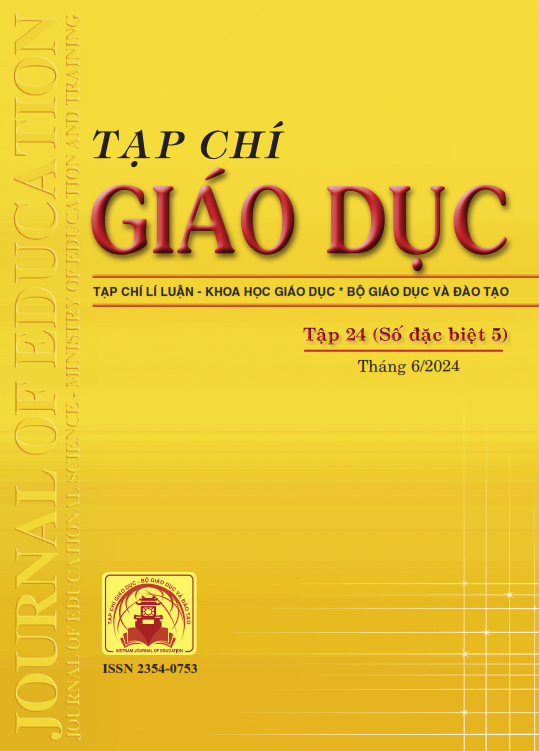Đề xuất khung năng lực số trong dạy học cho sinh viên sư phạm ở trường đại học
Tóm tắt
Digital competence is considered a vital factor to achieve success in study, research and future career development. Digital industries have become a key factor in the economy; for educational institutions to become digital business models, lecturers and students must be the ones to take advantage of the benefits of technology, while supporting the community and promoting innovation and creativity in the next generations. This article proposes a digital competence framework in teaching for pedagogical students at Vietnamese universities to meet the requirements of digital transformation in education and training and the strong impact of the 4.0 Industrial Revolution. The research results aim to effectively exploit the digital environment in teaching, bringing motivation and excitement to learners; contributing to improving teaching quality, forming and developing qualities and competence for students.
Tài liệu tham khảo
Bộ GD-ĐT (2018). Thông tư số 20/2018/TT-BGDDT ngày 22/8/2018 về ban hành quy định chuẩn nghề nghiệp giáo viên cơ sở giáo dục phổ thông.
CAUL (2015). Council of Australian University Librarians. Digital Dexterity Framework
Council of Europe (n.d.). Digital Citizenship Education (DCE) - A conceptual model. https://www.coe.int/en/web/digital-citizenship -education/a-conceptual-model.
Ferrari, A. (2012). Digital Competence in Practice: An Analysis of Frameworks. European Commission Joint Research Centre Institute for Prospective Technological Studies: Spain.
JISC (2021). Building digital capability. https://digitalcapability.jisc.ac.uk/
Killen, C. (2018). Collaboration and Coaching: Powerful Strategies for Developing Digital Capabilities. In Digital Literacy Unpacked, 29-44.
Kơrutecxki V.A. (1978). Tâm lí năng lực toán học của học sinh (bản dịch của Phạm Văn Hoàn, Lê Hải Châu, Hoàng Chúng). NXB Giáo dục.
Phạm Minh Hạc (1992). Một số vấn đề về tâm lí học. NXB Giáo dục.
Rubinstein, X. L. (1989). Những cơ sở của tâm lí học đại cương. NXB Giáo dục.
Secker, J. (2018). The trouble with terminology: rehabilitating and rethinking “digital literacy”. In Digital Literacy Unpacked, pp. 3-16. Facet Publishing. http://doi.org/10.29085/9781783301997.003
Thủ tướng Chính phủ (2020). Quyết định số 749/QĐ-TTg ngày 03/6/2020 phê duyệt “Chương trình chuyển đổi số quốc gia đến năm 2025, định hướng đến năm 2030”.
Thủ tướng Chính phủ (2022). Quyết định số 131/QĐ-TTg ngày 25/01/2022 phê duyệt Đề án “Tăng cường ứng dụng công nghệ thông tin và chuyển đổi số trong giáo dục và đào tạo giai đoạn 2022-2025, định hướng đến năm 2030”.
UNESCO (2018). A Global framework of reference on digital literacy skills for indicator 4.4.2. UNESCO Institute for Statistics.
Vuorikari, R., Kluzer, S., & Punie, Y. (2022). DigComp 2.2: The Digital Competence Framework for Citizens - With new examples of knowledge, skills and attitudes. Publications Office of the European Union. http://doi.org/10.2760/ 115376, JRC128415
Đã Xuất bản
Cách trích dẫn
Số
Chuyên mục
Giấy phép

Tác phẩm này được cấp phép theo Ghi nhận tác giả của Creative Commons Giấy phép quốc tế 4.0 .












